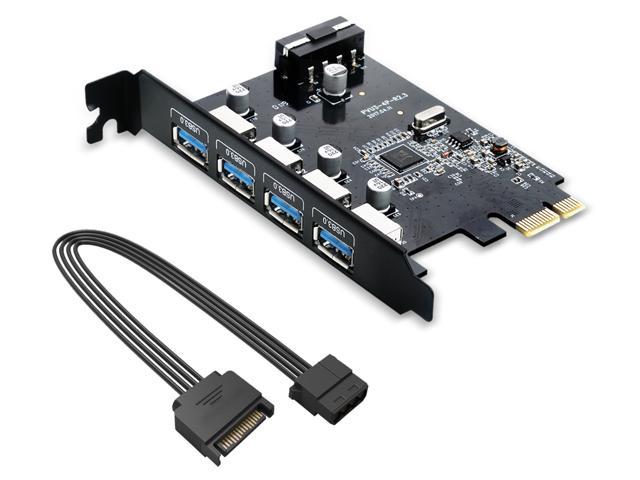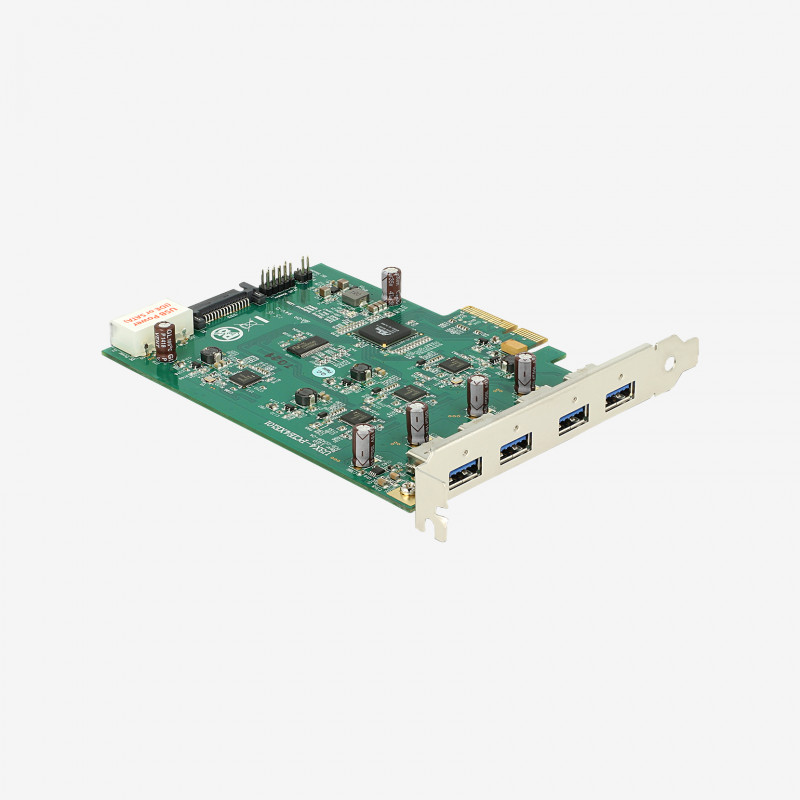
- Usb 3.0 pci express card full#
- Usb 3.0 pci express card pro#
- Usb 3.0 pci express card Pc#
- Usb 3.0 pci express card Bluetooth#
Usb 3.0 pci express card Bluetooth#
You should be able to use any Macintosh-compatible bluetooth adapter.Ģ) Select a different hard drive case with better shielding.ģ) You may try different USB 3.0 cables. Sonnet has successfully tested this solution with an IOGear Model GBU421WM USB to Bluetooth adapter. There are several possible solutions:ġ) Purchase a USB bluetooth dongle to replace internal bluetooth, connect it via a USB extension cable, and locate it away from the USB 3.0 storage unit.

USB 3.0 is known to cause radio frequency interference on 2.4 GHz wireless devices. Unfortunately, this can be a common issue with USB3 and Bluetooth. Hello! I'm very sorry to hear about any issues with the Sonnet Allegro. Use of USB 2.0 cables between USB 3.0 devices and Allegro USB 3.0 4-Port is supported, but data transfers are limited to USB 2.0 speeds (up to 480 Mb/s).Response from OWC, Call Center February 5, 2018
Usb 3.0 pci express card Pc#
Mac (Intel® or M1) or Windows PC via a Thunderbolt to PCIe Card Expansion System
Usb 3.0 pci express card pro#
(compatible with Mac Pro 3,1 PCIe 1.1 slot) Specifications subject to change without notice. Supports hot-pluggable and hot swappable device connection USB attached SCSI protocol supported under Allegro USB 3.0 4-Port PCIe Computer CardĬomplies with OHCI (Open Host Controller Interface), EHCI (Enhanced Host Controller Interface), and xHCI (eXtensible Host Controller Interface) standards.USB 3.0 with Standard-A male connector, USB 2.0 with Standard-A male connector (1) HDs, SSDs, DVDs, and Blu-ray devices up to 2A per port (2) The Allegro also supports the USB 3.0 charging specification that enables you to simultaneously charge and sync your iPad®, iPhone®, or other device that supports USB 3.0 charging! Delivering up to 10W of power per port, this Sonnet solution supports USB 3.0 bus-powered hard drives, SSDs, DVDs & Blu-ray™ devices without the need to connect an additional AC power adapter. Sonnet specially engineered the Allegro PCIe card to provide extra power through its ports without the need for you to connect an auxiliary power cable.

Supports Hot-Swappable Device Connection-Plug in and disconnect peripherals without shutting off your computerĪdd USB 3.2 Gen 1 to Thunderbolt Expansion Systems-Add four speedy USB-A 5Gbps ports to Thunderbolt to PCIe card expansion systemsĮasy Installation-Quick and easy user installation into any available PCIe slot of your computer Super-Powered Ports-Supports USB 3.0 bus-powered hard drives, SSDs, DVDs & Blu-ray devices with up to 2.0A per portĬharging Ports-Supports USB 3.0 charging port handshake, and will simultaneously synch and charge iPads and other devices that support USB 3.0 charging at 1.5A per deviceīroad USB Device Support & Compatibility-Supports storage, hubs, and other USB-IF compliant devices compatible with USB 2.0 devices

Speedy Performance-Transfers data up to 10x faster than over USB 2.0 connections This card installs easily into any PCI Express® (PCIe) slot that supports a full-height card, features hot-pluggable and hot-swappable device connection support with automatic device configuration, and works with all USB-IF compliant USB peripherals.Īdds USB 3.2 Gen 1 Connectivity-Adds four USB-A 5Gbps ports to your Mac Pro®, Windows PC®, or Linux® computer with PCIe slots or Thunderbolt™ to PCIe card expansion system The Allegro features a PCIe 2.0 bus interface to take advantage of your computer’s fast expansion card slots.
Usb 3.0 pci express card full#
Though you can connect them to your computer’s USB 2.0 ports, their performance would be reduced by as much as 85 percent! Don’t settle for slow performance-install a Sonnet Allegro Type-A USB 3.2 PCIe 4-Port (1) card to instantly add four SuperSpeed USB 5Gbps ports to your system to take full advantage of today’s drives’ performance capabilities. Most drives available today include faster USB interfaces and offer significantly better performance than USB 2.0-equipped drives. Your computer’s USB 2.0 ports are perfectly adequate for connecting mice, keyboards, and printers, but if you need to connect external storage drives, USB 2.0 ports are underpowered in more ways than one-limiting data transfer speeds to around 25–30 MB/s, they can hardly be called “high performance”.


 0 kommentar(er)
0 kommentar(er)
